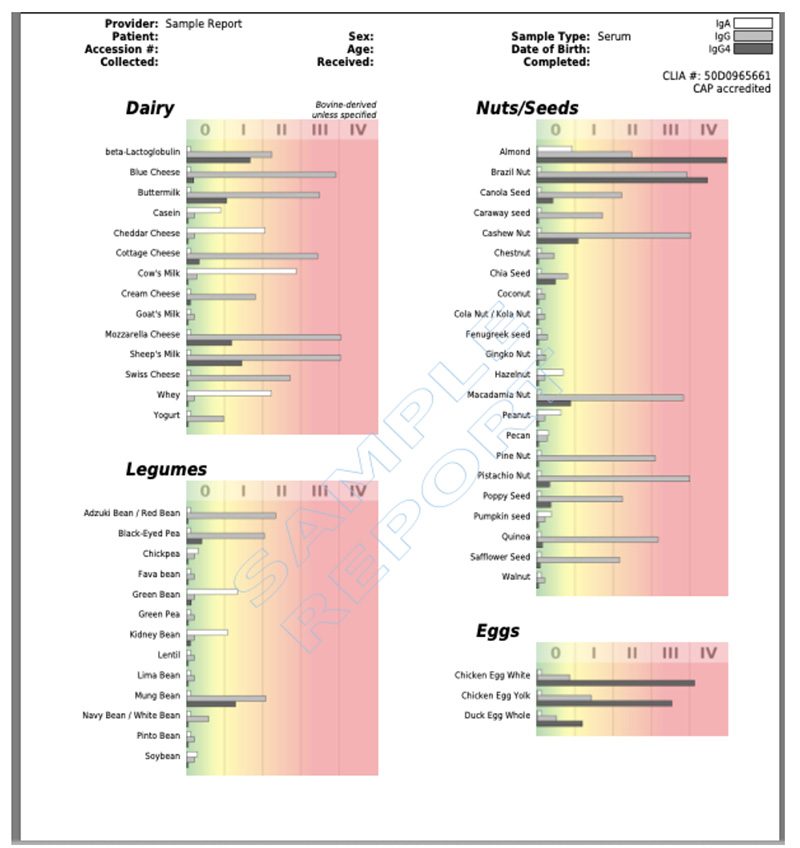US BioTek General Food Panel: IgG - 96 General Foods
Allergic and other hypersensitivity reactions to foods and aeroallergens are characterized by elevated allergen-specific antibody levels in the affected individual’s blood. Research indicates that these types of reactions are implicated in a number of health problems. Through Enzyme Linked Immunosorbent Assay (ELISA) & Chemiluminescence methodology we have a useful tool to assess our patients’ allergies and sensitivities to a variety of common allergens. We test the following:
| Fish/Crustacea/Mollusk | Grains/Legumes | Vegetables | Fruits |
| Clam, Manila Cod, Atlantic Crab, Dungeness Halibut Lobster, American Oyster Red Snapper Salmon, Pacific Shrimp, Western Sole Tuna, Yellow Fin | Almond Amaranth Barley Bean, Kidney Bean, Lima Bean, Pinto Bean, Soy Bean, String Buckwheat Corn Filbert Gliadin, Wheat Gluten, Wheat Lentil Oat Pea, Green Peanut, Runner Pecan Rice, White Rye Sesame Spelt Sunflower Walnut, English Wheat, Whole | Asparagus Avocado Beet, Red Broccoli Cabbage, White Carrot Cauliflower Celery Cucumber Garlic Lettuce Mushroom, Common Olive, Black Onion, White Pepper, Green Bell Potato, Sweet Potato, White Pumpkin Radish Spinach, Green Squash, Zucchini Tomato, Red | Apple Apricot Banana Blueberry Coconut Cranberry Grape Grapefruit Lemon Orange Papaya Peach Pear Pineapple Plum Raspberry, Red Strawberry |
| Dairy | Meat/Fowl | Miscellaneous | |
| Casein Cheese, Cheddar Cheese, Cottage Cheese, Mozzarella Milk Milk, Goat Whey Yogurt | Beef Chicken Egg White, Chicken Egg Yolk, Chicken Lamb Pork Turkey | Cocoa Bean Coffee Bean Honey Sugar Cane Yeast, Baker’s Yeast, Brewer’s |
IgG (immunoglobulin G) testing is a useful guide for structuring elimination diets in many chronic conditions. Individuals with neurological, gastrointestinal, and movement disorders often suffer from IgG food allergies. These people may continue to eat offending foods unaware of their potential effects. IgG antibodies provide long term resistance to infections and have a much longer half life than the traditional IgE allergy. Symptoms may occur hours or days after the offending food has been eaten. The 93 foods tested in the IgG Food Allergy Test w/ Candida can identify problem food so it can be eliminated from the patient’s diet. This elimination of IgG positive foods can improve symptoms of irritable bowel syndrome, autism, AD(H)D, cystic fibrosis, rheumatoid arthritis, and epilepsy according to numerous clinical studies.
The Great Plains Laboratory, Inc. has added Candida to the IgG Food Allergy Test. Candida problems are caused when the benign yeast form of Candida albicans mutates to its fungal form. Candida can take over sections of the intestinal wall causing numerous symptoms. As it grows out of balance it produces toxins that create holes in the intestinal lining, leading to leaky gut syndrome. After entering the blood, Candida albicans causes an inflammatory immune system response. A wide range of disorders have been linked to Candida including autism, multiple sclerosis, depression, and chronic fatigue. Use of antibiotics, oral contraceptives, chemotherapy, and anti-inflammatory steroids greatly increase susceptibility to Candida.
The Benefits of Testing
- Helps determine if food reactions are contributing to physical or mental symptoms
- Removal of highly reactive foods from the diet is a non-invasive, food-based therapy that often mitigates a patient's symptoms
- Research and clinical studies suggest food allergies identified by IgG testing can be a major contributing factor in many chronic health conditions
Food rotation and elimination diets can reduce stress on the immune system, lower gut inflammation, resolve food cravings, and reduce the potential for eating disorders.

